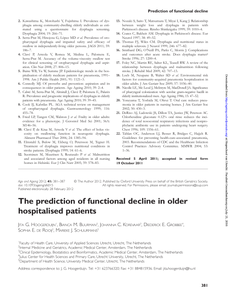Thirty to sixty per cent of older patients experience functional decline after hospitalisation, associated with an increase in dependence, readmission, nursing home placement and mortality. First step in prevention is the identification of patients at risk. The objective of this study is to develop and validate a prediction model to assess the risk of functional decline in older hospitalised patients.
DOCUMENT

Given the substantial increase in children attending center-based childcare over the past decades, the consequences of center-based childcare for children’s development have gained more attention in developmental research. However, the relation between center-based childcare and children’s neurocognitive development remains relatively underexplored. The aim of this study was therefore to examine the relations between quantity of center-based childcare during infancy and the neurocognitive development (both functional brain networks and self-regulation) of 584 Dutch children. Small-world brain networks and children’s self-regulation were assessed during infancy (around 10 months of age) and the preschool period (2–6 years of age). The findings revealed that the quantity of center-based childcare during infancy was unrelated to individual differences in children’s functional brain networks. However, spending more hours per week in center-based childcare was positively related to the development of self-regulation in preschool age children, regardless of children’s sex or the levels of exposure to risk and maternal support in the home environment. More insight into the positive effects of center-based childcare on children’s development from infancy to toddlerhood can help to increase our insight into a better work–life balance and labor force participation of parents with young children. Moreover, this study highlights that Dutch center-based childcare offers opportunities to invest in positive child outcomes in children, including self-regulation.
DOCUMENT

Objective: To obtain insight into (a) the prevalence of nursing staff–experienced barriers regarding the promotion of functional activity among nursing home residents, and (b) the association between these barriers and nursing staff–perceived promotion of functional activity. Method: Barriers experienced by 368 nurses from 41 nursing homes in the Netherlands were measured with the MAastrIcht Nurses Activity INventory (MAINtAIN)-barriers; perceived promotion of functional activities was measured with the MAINtAIN-behaviors. Descriptive statistics and hierarchical linear regression analyses were performed. Results: Most often experienced barriers were staffing levels, capabilities of residents, and availability of resources. Barriers that were most strongly associated with the promotion of functional activity were communication within the team, (a lack of) referral to responsibilities, and care routines. Discussion: Barriers that are most often experienced among nursing staff are not necessarily the barriers that are most strongly associated with nursing staff–perceived promotion of functional activity.
DOCUMENT
